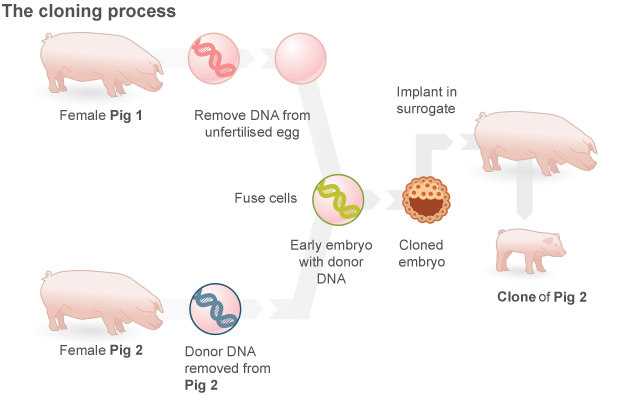You hear the squeals of the pigs long before reaching a set of long buildings set in rolling hills in southern China.
Feeding time produces a frenzy as the animals strain against the railings around their pens. But this is no ordinary farm.
Run by a fast-growing company called BGI, this facility has become the world's largest centre for the cloning of pigs.
The technology involved is not particularly novel - but what is new is the application of mass production.
The first shed contains 90 animals in two long rows. They look perfectly normal, as one would expect, but each of them is carrying cloned embryos. Many are clones themselves.
This place produces an astonishing 500 cloned pigs a year: China is exploiting science on an industrial scale.
To my surprise, we're taken to see how the work is done. A room next to the pens serves as a surgery and a sow is under anaesthetic, lying on her back on an operating table. An oxygen mask is fitted over her snout and she's breathing steadily. Blue plastic bags cover her trotters.
Two technicians have inserted a fibre-optic probe to locate the sow's uterus. A third retrieves a small test-tube from a fridge: these are the blastocysts, early stage embryos prepared in a lab. In a moment, they will be implanted.
The room is not air-conditioned; nor is it particularly clean. Flies buzz around the pig's head.
My first thought is that the operation is being conducted with an air of total routine. Even the presence of a foreign television crew seems to make little difference. The animal is comfortable but there's no sensitivity about how we might react, let alone what animal rights campaigners might make of it all.
I check the figures: the team can do two implantations a day. The success rate is about 70-80%
Dusk is falling as we're shown into another shed where new-born piglets are lying close to their mothers to suckle. Heat lamps keep the room warm. Some of the animals are clones of clones. Most have been genetically modified.
The point of the work is to use pigs to test out new medicines. Because they are so similar genetically to humans, pigs can serve as useful "models". So modifying their genes to give them traits can aid that process.
One batch of particularly small pigs has had a growth gene removed - they stopped growing at the age of one. Others have had their DNA tinkered with to try to make them more susceptible to Alzheimer's.
Back at the company headquarters, a line of technicians is hunched over microscopes. This is a BGI innovation: replacing expensive machines with people. It's called "handmade cloning" and is designed to make everything quicker and easier.
The scientist in charge, Dr Yutao Du, explains the technique in a way that leaves me reeling.
"We can do cloning on a very large scale," she tells me, "30-50 people together doing cloning so that we can make a cloning factory here."
A cloning factory - an incredible notion borrowed straight from science fiction. But here in Shenzhen, in what was an old shoe factory, this rising power is creating a new industry.
Via BBC

